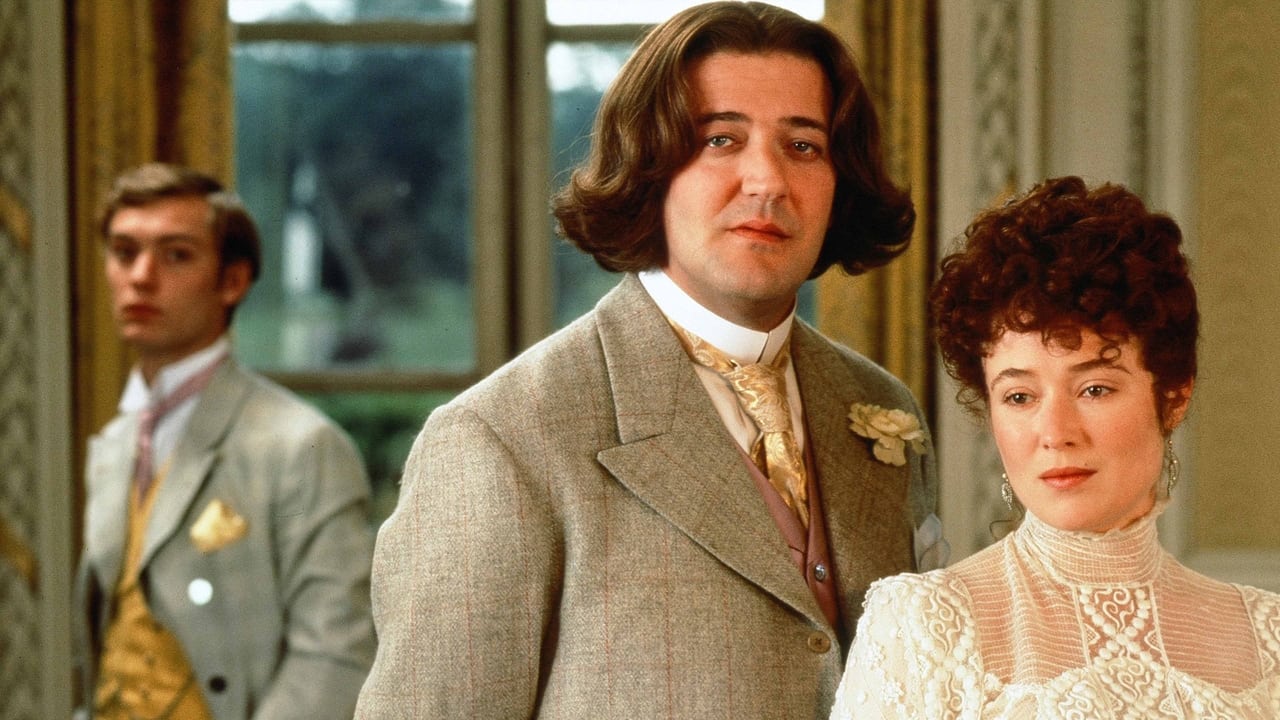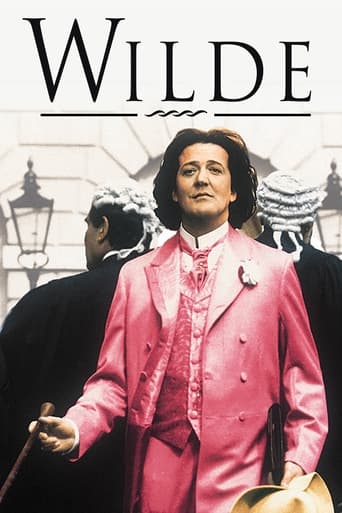

We yield to no one in our appreciation of Stephen Fry (except maybe for that woman who sings the song on YouTube about having his baby), but this tastefully appointed biopic was a bit of a letdown. Fry as Wilde sails serenely through the opening scenes, wowing a crowd of shirtless miners in Colorado, wedding a beautiful young admirer, then, suddenly squeamish after the birth of their second child, allowing himself to be seduced by another young, male admirer (Michael Sheen, the guy who always plays Tony Blair), trading up to Ioan Gruffud, then to JLaw himself, as Bosie. Fry and Law may have seemed like strong, perhaps inevitable, casting choices, but neither one brings much intensity to his role, and their relationship seems oddly uninvolving—more like tea with a favorite uncle than "feasting with panthers," in Wilde's famous phrase. A few sparks fly when Tom Wilkinson looms up, in a fine nutball turn, as Bosie's father, the Marquess of Queensbury, but the pace slackens again in the crucial courtroom scenes, and we had to resort to Wikipedia to find out why the MoQ thought that Bosie's brother Frank was getting "buggered by that Jew Rosebery" and what Frank's (alleged) suicide had to do with Wilde's disastrous decision to prosecute the marquess for libel. Jennifer Ehle, as the almost-all-forgiving Constance Wilde, Vanessa Redgrave and Zoë Wanamaker don't have much to do besides show up for their costume fittings; Orlando Bloom, who gets one brief scene as a cheeky hustler, looks great in a bowler hat, though I pity the LotR fans who got the DVD from Netflix because they saw his name in the cast list.
... View MoreMr. Fry as Oscar Wilde is magnificent, marvelous, realistic and believable from start to finish. The cast from his mother, with too infrequent appearances by Vanessa Redgrave, his beautiful wife, Constance (Jennifer Ehle) and his boys, all evoked the Wilde I imagined.Alfred Douglas (Jude Law) was just a little too pretty perhaps, and Robbie Ross (Michael Sheen) glowed in his warm friendship until the end, and certainly from the beginning.We've had other terrific films about English laws about homosexually and their rigidity, but this story is not imagined but the real life of an imaginative, spirited, true to himself man. I couldn't help weeping for Oscar as I watched Fry go from the bon vivant to the prisoner. I have only one objection to the film and it is the ending. Lord Alfred Douglas was a selfish man, with few scruples, and let Oscar Wilde down badly and unconscionably. This is not well conceived at the film's conclusion by expressing a joyous reunion rather the truth of Douglas' shameful behavior.
... View MoreThe Irish writer Oscar Wilde (Stephen Fry) returns to London from America and gets married with Constance Lloyd Wilde (Jennifer Ehle) in the Victorian England. They have two children, Cyril and Vyvyan, and he makes lots of money with his successful plays. He gets close to the young Robbie Ross (Michael Sheen) and "leaves the closet", assuming his homosexuality and having brief affairs with youths. When he meets the corrupt Lord Alfred 'Bosie' Douglas (Jude Law), he falls in love for the young man; but Bosie's father goes to the court accusing the writer "posing sodomite" and Wilde is sentenced to two years of hard labor. His health is affected by the unhealthy conditions in prison and he has a short life in Paris after being discharged from the imprisonment. "Wilde" discloses the faithful biography of the Irish writer Oscar, with great and bold performances, witty dialogs and a beautiful reconstitution of the life in the Victorian period. My only remark is the excessive and repetitive homosexual scenes with the visible intention of pleasing the gay communities, but totally unnecessary to the context of the story. The running time of 118 minutes is too long and boring but could be shorter with the edition of the foregoing sequences. My vote is six.Title (Brazil): "Wilde"
... View MoreIn 1997 Stephen Fry was enjoying an unprecedented surge of sympathy and reverence from the British public. Only two years previously he had abandoned a West End play after only three nights and fled abroad. The fuss that his episode created effectively ignited the conscience of the British people who, given the choice of vilifying a performer for acting (apparently) unprofessionally or sympathising with an overburdened national treasure chose the latter.This is an important story in relation to Wilde, released only two years later. Oscar Wilde was a character not only of similar physical attributes, intellect and sexuality as Fry but also with the same standing in relation to society (and specifically London society = the media). However, for all his popularity, Wilde's pecadilloes ultimately brought him public opprobrium and he fell foul of the law. Fry however rediscovered his confidence to assume a more exalted mantle in the estimation of the British public following Cell Mates-gate.This film is Fry riding that public affection - and failing to really return to love, frankly. Wilde is a more of a document than a drama, despite super turns from Jude Law as Bosie Douglas and Jennifer Ehle as Wilde's wife. It's a competent film but it doesn't touch me at all. Most strangely perhaps is that the film fudges an assessment of Wilde's standing in retrospect: neither the document nor the drama come down in judgement either way on the man or the life. Given the personal affection of Fry for Wilde it's all very odd. 4/10
... View More